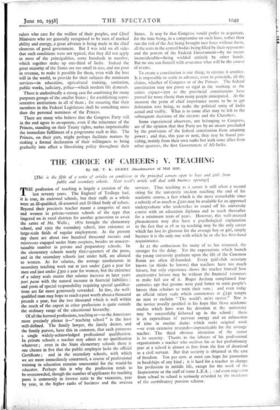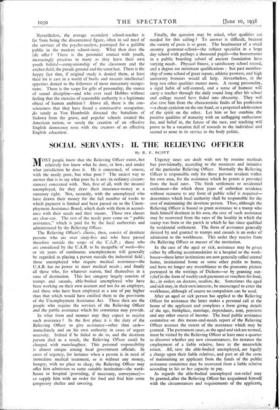THE CHOICE OF CAREERS : V. TEACHING
By DR. T. K. DERRY (Headmaster of Mill Hill)
[This is the fifth of a series of articles on conditions in the principal careers open to boys and girls from . public and secondary schools. Next week's article will deal with business openings]
THE profession of teaching is largely a creation of the last seventy years. The England of Trollope had, it is true, its endowed schools, but their staffs as a whole were an ill-qualified, ill-assorted and ill-liked body of ushers. Beyond their precincts teacher meant a congeries of men and women in private-venture schools of the type that lingered on in rural districts for another generation to await the satire of Mr. Wells ; 1870 brought the elementary school, and 1902 the secondary school, into existence as large-scale fields of regular employment. At the present day there are about two hundred thousand masters and mistresses engaged under State auspices, besides an unascer- tainable number in private and preparatory schools. In the elementary schools nearly three-quarters of the posts, and in the secondary schools just under half, are allotted to women. As for salaries, the average emoluments in secondary teaching work out at just under £400 a year for men and just under k300 a year for women, but the existence of a salary scale means that salaries increase in later years pari passu with the natural increase in financial liabilities : and posts of special responsibility requiring special qualifica- tions are far more generously rewarded. In fine, the well- qualified man may hope to reach a post worth about a thousand pounds a year, but the two thousand which is well within the reach of the expert in other professions is quite outside the ordinary range of the educational hierarchy.
Of all the learned professions, teaching or—as the Americans more precisely phrase it—" teaching school " is the least well-defined. The family lawyer, the family doctor, and the family parson, have this in common, that each possesses a single widely-acknowledged professional qualification. In private schools a teacher may admit to no qualification whatever ; even in the State elementary schools there is one chance in five that the public employee lacks the official Certificate ; and in the secondary schools, with which we are more immediately concerned, a course of professional training in education remains unessential for the would-be educator. Perhaps this is why the profession tends to be overcrowded, though the number of applicants for teaching posts is commonly in inverse ratio to the vacancies, year by year, in the higher ranks of business and the oversea services. Thus teaching as a career is still often a second string for the university student reaching the end of his academic course, a fact which is the more remarkable since a subsidy of as much as £200 may be available for an approved undergraduate who undertakes to round off his university course with an education diploma and to teach thereafter for a minimum term of years. However, this well-attested phenomenon may also have a psychological explanation in the fact that at 18 or 19 teaching may be the only career which has lost its glamour for the average boy or girl, simply because it is the only one with which he or she has first-hand acquaintance.
At 21 the enthusiasm for many of us has returned, the stronger for the delay. Yet the expectations which launch the young university graduate upon the life of the Common Room are often ill-founded. Every golf-club secretary knows (or thinks he knows) that teachers have too much leisure, but only experience shows the teacher himself how unattractive leisure may be without the financial resources to make full use of it. Roger Aschaw complained four centuries ago that grooms were paid better to train people's horses than scholars to train their sons ; and even today an official salary scale which commences at £230 tempts no man to exclaim "The world's mine oyster." Nor is the novice usually justified in his hope that those academic studies which have won his devotion at the university may be successfully followed up in the school : there is an expenditure of nervous energy and an exhaustion of time in routine duties which make original work —or even extensive research—impracticable for the average teacher. The third obvious attraction of the career is its security. Thanks to the labours of his professional organisations a teacher who outlives his or her probationary year at a school is almost as free from the fear of dismissal as a civil servant. But that security is obtained at the cost of freedom. Ten per cent. at most can hope for promotion to headships of any kind ; it is hard for a teacher to change his profession in middle life, except for the work of the Inspectorate or the staff of some L.E.A. ; m nd even migration from school to school is seriously retarded by the incidence of the contributory pension scheme. Nevertheless, the average secondary school-teacher is far from being the discontented figure, often in sad need of the services of the psycho-analyst, portrayed for a gullible public in the modern school-story. What then does the life offer ? There is the perennial contact with youth, increasingly precious to many as they leave their own youth behind—companionship of the classroom and the cricket-field, the parade ground and the scout hut. There is the happy fact that, if original study is denied them, at least their lot is cast in a world of books and nascent intellectual appetites denied to the followers of more mercenary occupa- tions. There is the scope for gifts of personality, the source of sound discipline—and who ever read Hobbes without feeling that the exercise of reasonable authority is a legitimate object of human ambition ? Above all, there is the con- sciousness that they have found a constructive occupation. As surely as Von Humboldt directed the battalions of Sadowa from the grave, and popular schools created the American nation, so surely the creation of an effective English democracy rests with the creators of an effective English education. Finally, the question may be asked, what qualities are needed for this calling ? To answer is difficult, because the variety of posts is so great. The headmaster of a small country grammar-school—the subject specialist in a large day school with perhaps a thousand pupils—the housemaster in a public boarding school of ancient foundation have varying needs. Physical fitness, a satisfactory school record, and a degree are minimum qualifications : but past member- ship of some school of great repute, athletic prowess, and high university honours would all help. Nevertheless, in the long run other qualities matter more. A strong personality, a rigid habit of self-control, and a sense of humour will carry a teacher through the daily round long after his school and college record have faded into obscurity. They will also save him from the characteristic faults of his profession —a cheap cynicism on the one hand, or a perpetual adolescence of the spirit on the other. Let him or her combine the positive qualities of maturity with an unflagging enthusiasm for, and belief in, the future of the race, and teaching will prove to be a vocation full of rewards to the individual and second to none in its service to the body politic.











































 Previous page
Previous page